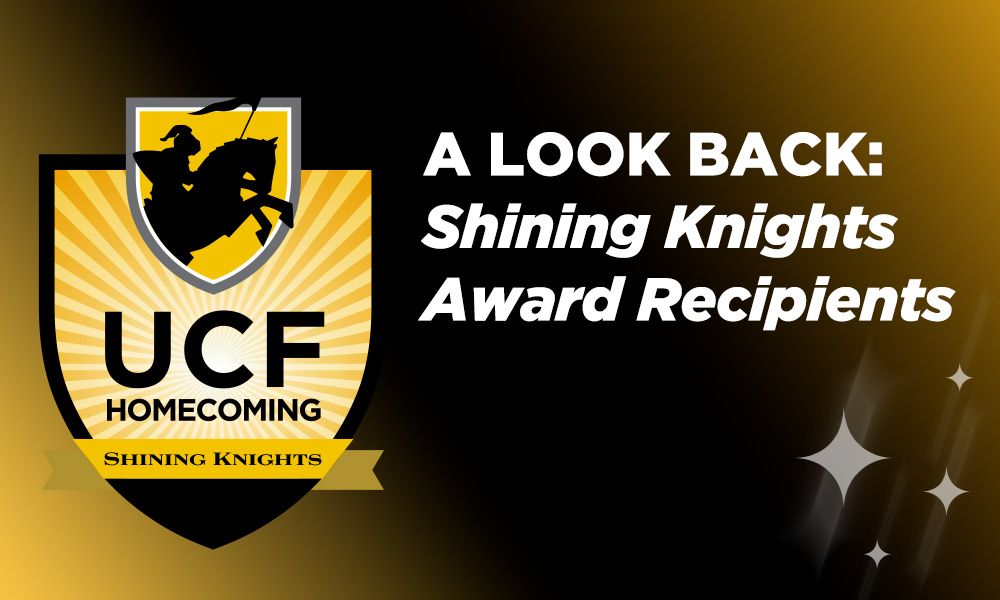On the Fast Track: Anne-Marie Blaney ’15 ’18MSHCI
When Anne-Marie Blaney ’15 ’18MSHCI learned that she had been inducted into the 2024 UCF Athletics Hall of Fame, one of her friends sent her some new UCF-branded gear to commemorate the occasion. The gift was much appreciated, she says. Blaney is now living in Michigan, but UCF is never far from her heart.
The news caught her by surprise, she says, even though she’d received multiple accolades for her athletic prowess during her time at UCF. Blaney, along with five other elite former UCF athletes, was inducted at a ceremony on Nov. 1.
The UCF Athletics Hall of Fame was established in 1998 to honor members of past athletic teams who have excelled in intercollegiate athletics at UCF, or gained national recognition in athletics following their departure from campus. It also gives special recognition to non-athletes who have contributed significantly to the development of the UCF Athletics program.
Before Blaney started at UCF, she was unsure about what “success” would look like for her – at the time, UCF was not necessarily known for distance running.
As a junior, Blaney was the first person from UCF, male or female, to qualify for the NCAA Championships in the 10K. The competition to earn one of those slots is fierce: athletes need to be among the top 24 nationally, in each individual event. Blaney was one of 12 individuals from the eastern United States to earn that distinction.
“It was such an honor to represent UCF at that highest level,” Blaney recalls. “And I felt pride in myself but seeing that UCF jersey on TV gave all of our team such a great feeling of excitement and possibilities.”
Becoming an elite athlete like Blaney does not happen overnight. Often, it is rooted in lessons learned at home.
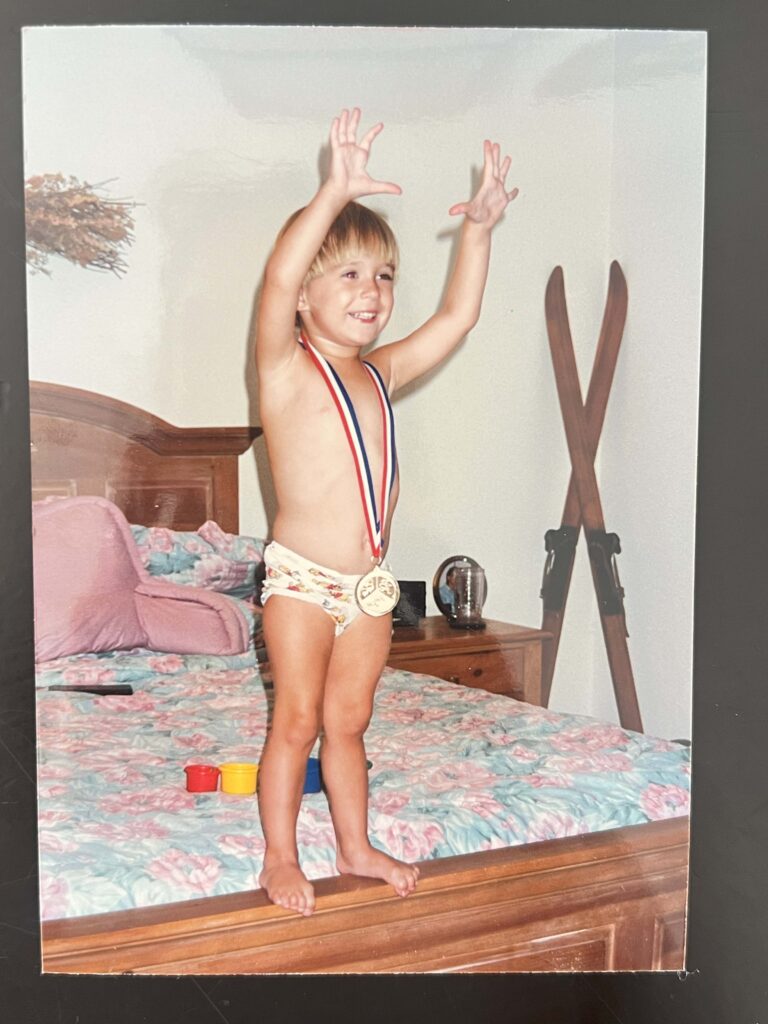
“My parents were always super-athletic growing up,” Blaney says, “And they were into pretty much all the sports.”
The Blaneys – her father, a cardiac rehab nurse; and her mother, a physical therapist – involved their children in sports whenever they could, she says.
Growing up in Ocala, Blaney recalled that in elementary school, if her parents were running a 5K, they would also encourage their children to participate in the “fun run” that would often be held alongside the longer, competitive course.
The more Blaney ran, the more she liked it. She funneled her aptitude for running into club soccer.
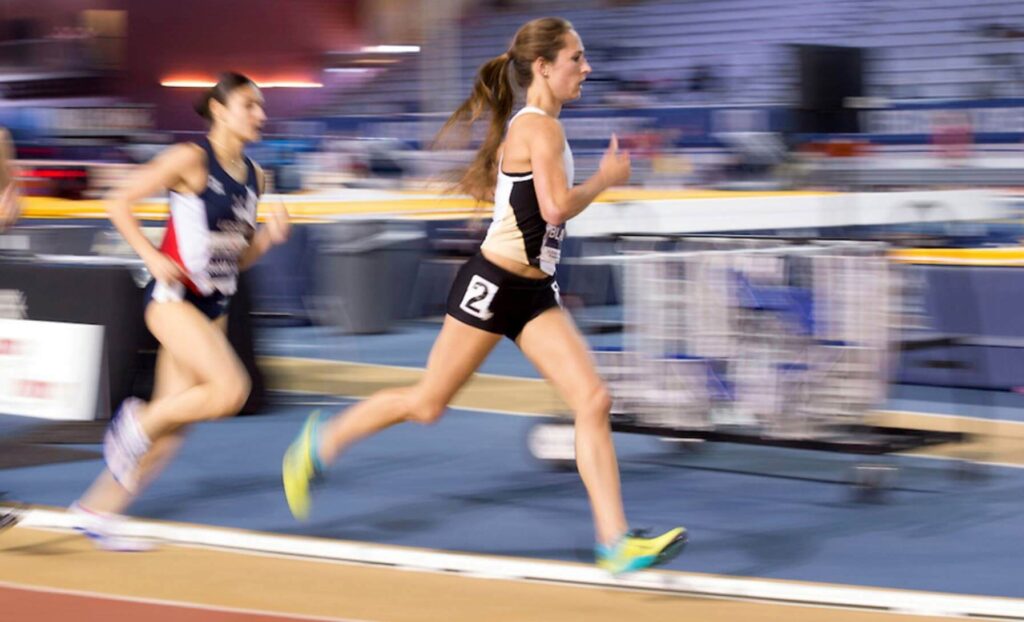
“I was good at soccer, but I wasn’t that good,” Blaney says. She much preferred running a prescribed distance, marking her time, and then working to beat that time.
Her parents saw that she was developing into a skilled distance runner and encouraged her to go out for cross country and track in high school. She ended up running all four years in high school.
By her junior year, Blaney says her track coach began getting letters of interest on her behalf from the athletic departments at smaller colleges.
It was a little overwhelming, she says.
“I loved running and playing tag as a kid,” Blaney says. “I think that’s the only real training I did before high school.”
Blaney’s father ran track for the University of Florida, and had maintained connections with his friends, many of whom had gone into coaching – and who had taken note of their friend’s talented daughter. She was invited to visit some colleges, including the University of Mississippi, where her father’s coach had transferred after the University of Florida.
“I loved all the schools I visited,” Blaney says. “It was tough to choose which one would be the right one for my life – and my future career. My parents told me to go with my gut.”
Eventually, her gut led her feet to UCF.
“UCF ended up being the best experience I could have ever asked for as a college athlete,” Blaney says. “I feel like I saw a progression in my performance that I might not have had at a different college, or with a different team, and just became a better athlete.”
Blaney says she was especially impressed with the holistic way every student-athlete is cared for, not just for their physical well-being, but also for their academic success.
As an undergraduate student, Blaney majored in health sciences through the College of Health Professions and Sciences. She wasn’t sure where the major would lead her, but she knew that her future career would involve helping people.
“The longer I was there, I realized how lucky I was with the coaches, the athletic trainers, academic advisors, and other individuals who worked with the athletes,” Blaneys says. “UCF Athletics leaves no stone unturned when it comes to supporting their athletes.”
There were mandatory programs and activities in which Blaney and the other athletes were required to participate, she says. Blaney admits that some of them, including the mandatory mock interview nights with local businesses were not her favorite – the interviews were helpful, but for Blaney, were way out of her comfort zone.
“Looking back, though, I realize it was because leadership cared about our future and were connecting us to future employers in the area so that we would have career options after we hung up our cleats.”
Blaney says she understands that it can be difficult to go from the highly structured environment experienced by student-athletes to life post-graduation.
“I think my transition was not so difficult as those student-athletes who were involved in other team sports,” Blaney says. “All of a sudden, I wasn’t competing anymore, but as a runner, I can run anywhere, anytime I want.”
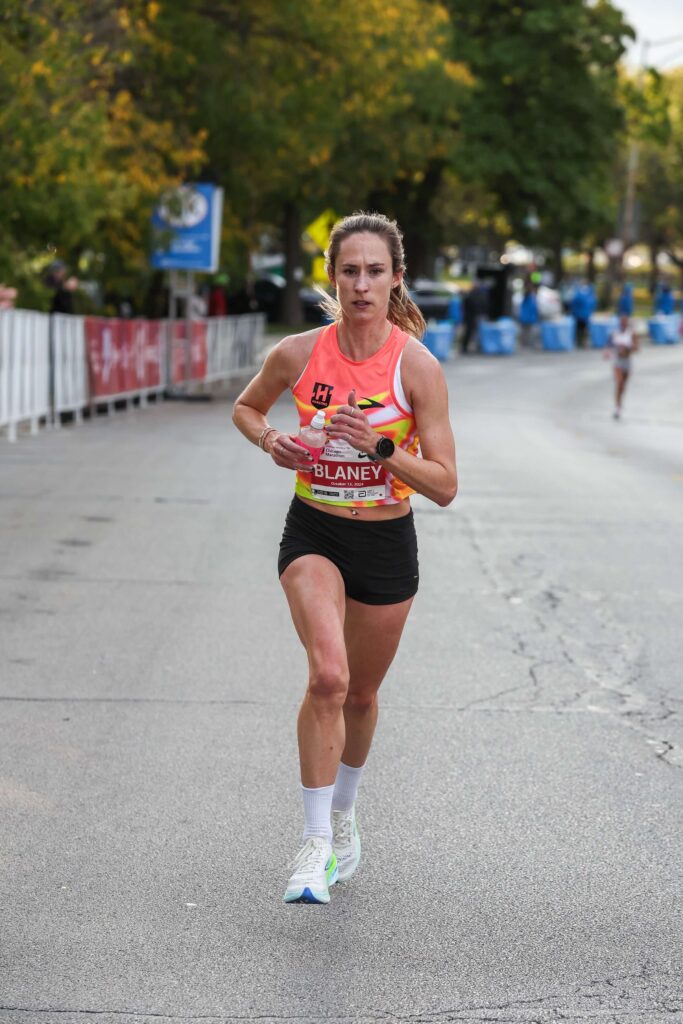
After graduation, Blaney knew she wanted to pursue a master’s degree in a healthcare-related field. She chose UCF’s online healthcare informatics program for its highly rated, accredited program, and continued to compete for UCF during the first year-and-a-half of her master’s program
“At the time, I thought that when I was done at UCF that I would finish my master’s program and hop right into the ‘real world,’” Blaney says.
But she had been hearing more and more about professional running, and her UCF coach at the time told her he had also been coaching professionals as well. Blaney began researching different groups that she could join and train with, and began visiting them, much in the same way she had visited prospective colleges. She landed at Hansons-Brooks Distance Project and is part of a team located in Rochester Hills, Mich.
“I’ve been with them ever since,” Blaney says. “I’ve been competing professionally for seven years, and our philosophy is that we spend a lot of time running the miles and training together so that we can work together and make each other better.”
There are professional running groups all over the world, Blaney says.
“Distance running isn’t like the NFL, where everyone’s paying attention and watching the teams,” Blaney says. “But track meets, marathons, and other running events are going on constantly, and the interest keeps growing.”
Blaney says she is also able to continue pursuing her Olympic dreams.
“There are really no constraints on eligibility,” Blaney says. “So long as I am running the Olympic trial standards, I’ll have a shot every four years.”
Blaney says her time trials have been getting better each year, and she is excited for the next Olympics in 2028.
In a typical day, Blaney meets and runs with her teammates, averaging between 14 to 16 miles a day.
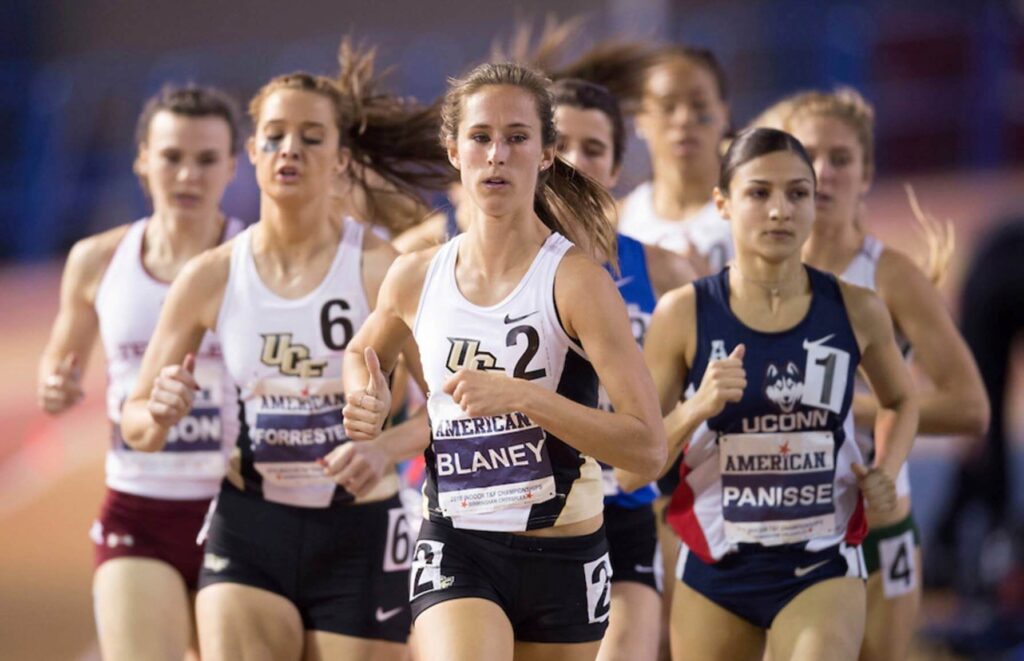
“I definitely put more miles on my legs than on my car,” Blaney laughs. “Right now, we’re up to 120 miles a week.”
And, she is also planning for the next phase of her career, whenever that might be, where she can take full advantage of her master’s degree.
“I really appreciate all the great people I’ve met through healthcare,” Blaney says. “In the last year-and-a-half of my master’s program, I had a dietician internship with a local nutritionist. I also spoke with the physicians who came to the field house about possibly going to medical school, but I knew that would be almost impossible to do with college sports.”
To supplement and expand her studies in healthcare informatics, Blaney has been taking classes to become a cancer tumor registrar. According to the National Cancer Registrars Association, cancer registrars are data information specialists who capture a complete history, diagnosis, treatment and health status for every cancer patient in the United States.
Blaney’s interest in becoming a cancer tumor registrar stems from learning about a Michigan cancer doctor who told all his patients they had some incurable form of cancer. He pumped his healthy patients full of chemotherapy, ruining their immune systems, and left his sick patients undertreated.
When Blaney becomes certified, she will be able to identify and register patients who have been diagnosed or treated with cancer and register them in the cancer registry database.
“It always important to have a clean database,” Blaney says. “But it is especially important for a tumor registry, where the aggregated anonymous data can facilitate improved outcomes in everything from increased funding for cancer research to the development of treatment programs.”
Blaney explains that acquiring accurate data for the registry is her way to help people through the healthcare system without being intrusive. She sees her studies as a natural extension of her master’s degree and is looking forward to analyzing the trove of data that can lead to providing help for the nearly two million individuals diagnosed with cancer each year in the United States.
“Even though it often looks like cancer is never going away,” Blaney says, “We still need everyone we can working on it and trying to eradicate it if possible.”
When she was at UCF, Blaney says that she had not necessarily considered that she would gravitate toward this particular aspect of healthcare, but considers the ability to forge one’s own path one of the greatest aspects of being a Knight.
“I realize that my UCF story is a little different,” Blaney says. “Whenever I read about our alumni and what they’ve been doing since graduation, I like how each person’s story is unique, and how we are still interconnected. We all have different ways of how you can do life after UCF, and I look forward to keeping involved with our community for as long as I can.”
